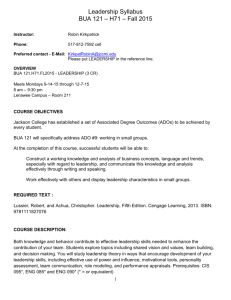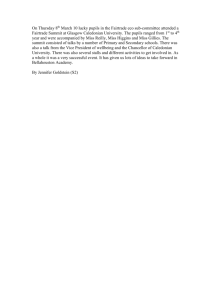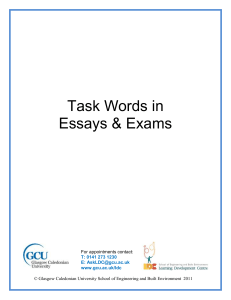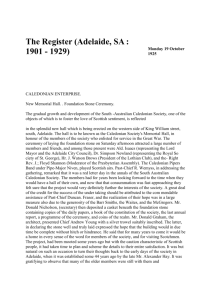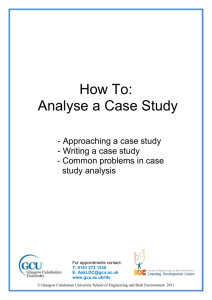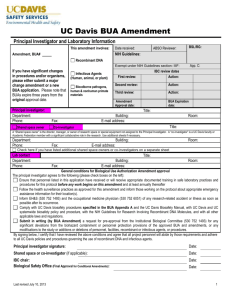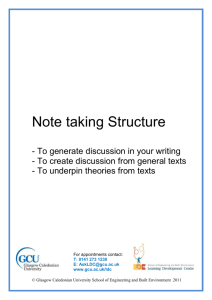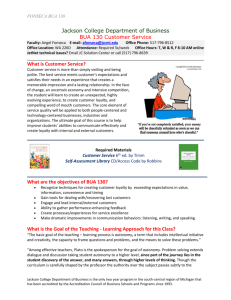DOCUMENT IS THE PROPERTY OF HER BRITANNIC MAJESTY S GOVERNMENT 0
advertisement
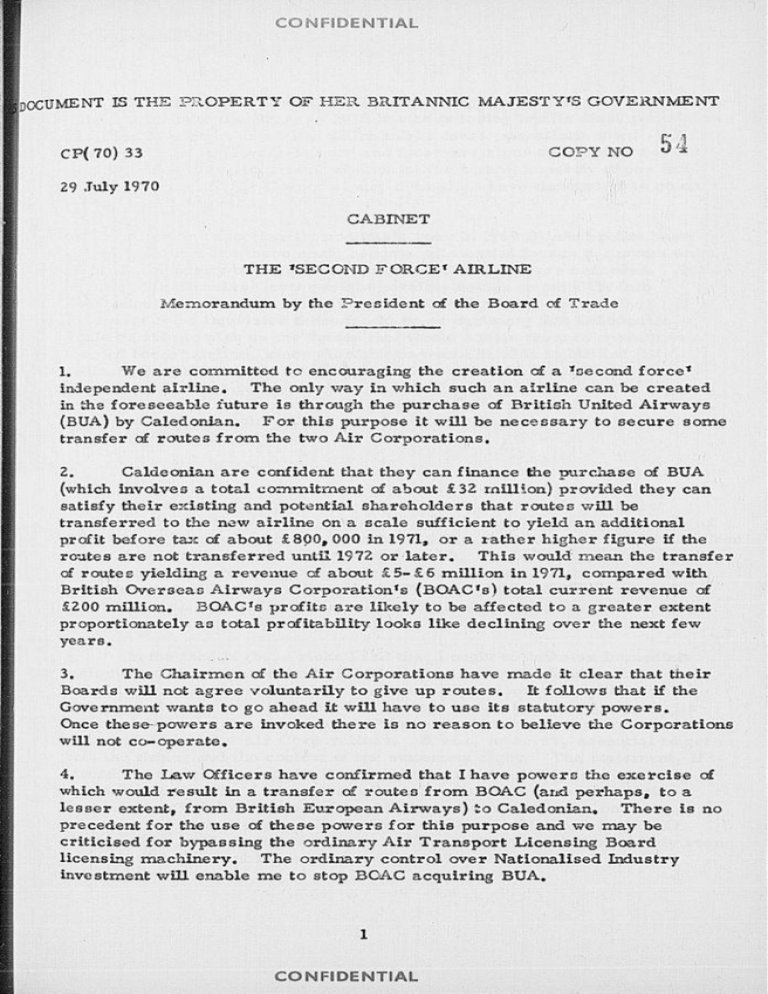
DOCUMENT IS THE P R O P E R T Y OF HER BRITANNIC MAJESTY S GOVERNMENT r CP( 70) 33 COPY NO 0 29 July 1970 CABINET THE "SECOND F O R C E AIRLINE r Memorandum by the President of the Board of Trade 1. We are committed to encouraging the creation of a *second f o r c e independent airline. The only way in which such an airline can be created in the foreseeable future is through the purchase of British United Airways (BUA) by Caledonian. F o r this purpose it will be necessary to secure some transfer of routes from the two A i r Corporations. 1 2. Caldeonian are confident that they can finance the purchase of BUA (which involves a total commitment of about £32 million) provided they can satisfy their existing and potential shareholders that routes will be transferred to the new airline on a scale sufficient to yield an additional profit before tax of about £800, 000 in 1971, or a rather higher figure if the routes are not transferred until 1972 or later. This would mean the transfer of routes yielding a revenue of about £5-£6 million in 1971, compared with British Overseas Airways Corporation^ ( B O A C s ) total current revenue of £200 million. B O A C s profits are likely to be affected to a greater extent proportionately as total profitability looks like declining over the next few years. t 3, The Chairmen of the A i r Corporations have made it clear that their Boards will not agree voluntarily to give up routes. It follows that if the Government wants to go ahead it will have to use its statutory powers. Once these-powers are invoked there is no reason to believe the Corporations will not co-operate, - 4. The Lav/ Officers have confirmed that I have powers the exercise of which would result in a transfer of routes from BOAC (and perhaps, to a lesser extent, from British European Airways) to Caledonian, There is no precedent for the use of these powers for this purpose and we may be criticised for bypassing the ordinary A i r Transport Licensing Board licensing machinery. The ordinary control over Nationalised Industry investment will enable me to stop BOAC acquiring BUA. 1 5. The situation has been deteriorating rapidly recently in two respects following leaks to the P r e s s . 3UA has been losing traffic since people are unwilling to book on an airline which might cease operations soon. The morale of BUA employees is poor and there are signs that it may worsen rapidly. Secondly, in pursuit of a claim for complete parity of pay and conditions with the A i r Corporations, the unions have threatened to go on strike from 3 August. 6. After an exceptionally profitable year in 1969 BUA*s profits have sharply declined and these could become substantial losses if current union demands for parity of pay and conditions with BOAC were conceded. In this situation Sir Nicholas Cayzer might possibly decide to put BUA into liquidation or to concede complete parity in order to avoid a strike. If BUA were to be liquidated there would be no certainty that Caledonian would be able to pick up the routes that would enable them to operate as a second f o r c e airline, since all airlines would be able to bid and the ordinary long drawn out licensing procedures would have to be used. Moreover, in these circumstances, it would be much more difficult to justify the transfer of some BOAC routes to Caledonian, In the resulting confusion and uncertainty Caledonian s present financial backers would almost certainly lose Interest, T t T 7, If on the other hand BUA continued operations but conceded complete parity the new airline resulting from a Caledonian purchase of BUA would have greater difficulty in attaining the profitability It needs to attract continuing financial support. This concession might make the purchase of BUA impossible for any airline except BOAC. Caledonian would be piepared to pay comparable rates for comparable work, which in effect means parity in basic rates but intend to negotiate with the unions to secure comparable productivity agreements (and possibly some staging of their increased commitments). This is a different matter from proceeding to Immediate parity in pay Irrespective of productivity. 8. In the face of these risks I felt that I ought to make an immediate statement on the lines of the attached draft. When the Ministerial Committee on Economic Policy considered this statement on 27 July there was general agreement that the Government should pursue vigorously its policy of fostering the ^second f o r c e in spite of strong opposition from the trade unions and the A i r Corporations, It was, however, essential to get both the timing and the context of the statement right, The statement, if issued too early, might prejudice the chances of securing an early agreement to end the dock strike. It would also be a great pity If the second f o r c e ' airline came to be publicly suspect as one run on cheap labour, or if its launcMng coincided with strikes in BUA and in the A i r Corporations. E at all possible the BUA pay claim should be publicly seen to be a quite different issue from the *second f o r c e . t 1 1 2 9, As matters are developing, however, I consider that we should not delay our statement any longer, because of the risk that precipitate action by Sir Nicholas Cayzer or by the BUA employees might jeopardise the whole concept of a second f o r c e airline, I understand that Caledonian are prepared to move quickly to comparable pay for comparable work and there is evidence to suggest that, faced with a Government decision, the unions would negotiate with Caledonian as the prospective employer and would not force an immediate strike on 3 August, There have been suggestions that Mr Clive Jenkins might call out Air Corporation staff to prevent a transfer of routes, I do not think we can concede to such pressures, t 1 10, It is also for consideration whether I should be authorised to say that the Government will not, in any event, be prepared to approve a purchase of BUA by BOAC. Sir Nicholas Cayzer has continued to hope that, in the last analysis, the Government would approve such a purchase and for this reason he has not been as forthcoming as he might have been in his dealings with Caledonian, A statement on these lines would force both him and the unions to be more realistic in their dealings with Caledonian, On the other hand, the hope of an ultimate sale to BOAC may be one of the factors which will deter him from going into liquidation, I think we may have to make such a statement, but I would prefer to hold it until it is shown to be essential. CONCLUSION 11, I therefore seek the agreement of my colleagues to the Issue of the attached statement without more delay. It would have the effect of enabling Caledonian at once to start negotiation with BUA and to start discussing with the unions as the prospective *second f o r c e airline the standards of pay and productivity which should apply, I should like further to have authority to tell Sir Nicholas Cayzer, should this prove necessary, that the Government do not intend to permit BOAC to purchase BUA if the deal with Caledonian falls through. We must be clear,, however, that this could increase the possibility that BUA might be put into liquidation, with the consequences outlined above. We may have to take this risk. 1 M A C N Board of Trade SW1 28 July 1970 3 ANNEX CIVIL AVIATION A SECOND FORCE INDEPENDENT AIRLINE The Government wish the p r i v a t e s e c t o r of the c i v i l a v i a t i o n i n d u s t r y to be g i v e n the o p p o r t u n i t y t o form by amalgamation a "second f o r c e " a i r l i n e that would f i l l the r o l e of second f l a g c a r r i e r on major i n t e r n a t i o n a l r o u t e s as w e l l as s u s ­ taining extensive charter s e r v i c e s . Such an a i r l i n e , combining the r e s o u r c e s and s k i l l s of B r i t i s h United and Caledonian, could p r o v i d e a powerful a d d i t i o n a l source of a i r l i n e management and i n n o v a t i o n ; i t s e x i s t e n c e would permit the l i c e n s i n g of a second B r i t i s h c a r r i e r on those i n t e r n a t i o n a l r o u t e s such as the North A t l a n t i c where t h i s should i n c r e a s e the t r a f f i c c a r r i e d by B r i t i s h a i r l i n e s ; and i t could s e r v e those domestic r o u t e s where i t was d e s i r a b l e t o o f f e r the p u b l i c a c h o i c e of a i r l i n e s . 2. The Government accept that such a new a i r l i n e , i f i t can measure up to i t s t a s k , should be g i v e n p r e f e r e n c e o v e r other o p e r a t o r s i n the l i c e n s i n g o f new scheduled r o u t e s that would c o n t r i b u t e t o a v i a b l e r o u t e network, i n the l i c e n s i n g of a second c a r r i e r on e x i s t i n g scheduled r o u t e s o r in any s e c t o r of the market (such as long-haul i n c l u s i v e tour c h a r t e r s ) where t h e r e may f o r a time be room f o r only a l i m i t e d number o f o p e r a t o r s . Where the new a i r l i n e i s l i c e n s e d t o s e r v e a domestic route j o i n t l y with another o p e r a t o r , they accept the need p r o g r e s s i v e l y t o r e l a x any r e s t r i c t i o n s on the frequency of s e r v i c e s . They a l s o accept t h a t some e x c e p t i o n a l t r a n s f e r of r o u t e s from the p u b l i c s e c t o r - and p o s s i b l y some r a t i o n a l ­ i s a t i o n , i n c l u d i n g an exchange of r o u t e s T- w i l l be necessary i n the i n i t i a l s t a g e s , though not as a continuing p r o c e s s , i f the new a i r l i n e i s t o have a s u f f i c i e n t b a s i s at the o u t s e t . 3. BOAC s t o t a l revenue i s about £200m. F o r e c a s t s of i n t e r ­ c o n t i n e n t a l t r a f f i c p o i n t t o an expansion of about 14% a year up to 1975. A g a i n s t the background o f such growth a modest t r a n s f e r of r o u t e s from BOAC to the new a i r l i n e , r e p r e s e n t i n g something of the o r d e r of l\% or 3% o f t h e i r current annual revenue, would have small impact on BOACs c o n t i n u i n g expansion. Both revenue and employment w i l l continue t o i n c r e a s e . The r e t u r n on the p u b l i c investment need not be unduly impaired so long as the r o u t e s t r a n s f e r r e d from e i t h e r C o r p o r a t i o n did not s i g n i f i c a n t l y a f f e c t the o v e r a l l e f f i c i e n c y of t h e i r opera­ tions. 1 4. The A i r Corporations must remain our p r i n c i p a l f l a g c a r r i e r s b e a r i n g as i n the past the main weight of t h i s The r o u t e s to be t r a n s f e r r e d country s c i v i l aviation e f f o r t . must t h e r e f o r e be so chosen as to combine with the o v e r a l l n a t i o n a l i n t e r e s t the maximum b e n e f i t t o the v i a b i l i t y o f the new a i r l i n e w i t h the l e a s t impact on the A i r C o r p o r a t i o n s . 1 1 5. The c i v i l a v i a t i o n i n d u s t r y has been subject t o much u n c e r t a i n t y s i n c e 1967 and i t i s d e s i r a b l e that matters should be brought to a conclusion without f u r t h e r d e l a y . The Government are c o n s i d e r i n g l e g i s l a t i o n based on the recommendations o f the Edwards Committee f o r changes in the r e g u l a t o r y machinery; they a c c e p t , i n p r i n c i p l e , the establishment of a l i c e n s i n g a u t h o r i t y whose d e c i s i o n s w i l l be governed by a formal statement o f p o l i c y which w i l l r e f l e c t , among other t h i n g s , the c o n s i d e r a t i o n s s e t out i n t h i s White Paper. However, the Government c o n s i d e r i t important that the new a i r l i n e should be formed as q u i c k l y as p o s s i b l e and should have new routes t o serve by the summer o f 1971. They would p r e f e r the arrangements f o r the t r a n s f e r of r o u t e s to be made through normal l i c e n s i n g procedures a f t e r d i s c u s s i o n w i t h the a i r l i n e s concerned. They a c c e p t , however, that the A i r Corporations w i l l not w i l l i n g l y g i v e up even a small s e c t o r of t h e i r r o u t e s . I f necessary, t h e r e f o r e , pending the new l e g i s l a t i o n , they w i l l be prepared to use t h e i r powers under Section 3 ( 5 ) of the A i r Corporations Act 1967 and under Section 1 ( 3 ) of the C i v i l A v i a t i o n ( L i c e n s i n g ) A c t 1960, to ensure that the intended outcome i s not unduly d e l a y e d . 6. I t i s i n t h e b e s t i n t e r e s t s of the industry and of the country that a s t a b l e and v i a b l e s o l u t i o n should be found quickly. I n p a r t i c u l a r i t i s in the i n t e r e s t s of those who work i n BUA and i n Caledonian that the new f l a g c a r r i e r should have the s t r e n g t h and o p p o r t u n i t i e s that w i l l enable i t t o move q u i c k l y towards terms and c o n d i t i o n s o f employment comparable with those o f f e r e d by the A i r Corporations f o r comparable work. )"l 2
